Scottish Govt agree to create Judicial Register. A PETITION to create a register of judges’ interests for all members of Scotland’s judiciary – survived a stormy session of the Scottish Parliament’s Justice Committee – after a failed last-minute Tory led attempt to shut down the TEN YEAR judicial probe.
The attempt to close down Petition PE 1458 was led by the now former MSP Justice Committee Convener – Adam Tomkins of the Scottish Conservatives – who launched blistering criticism on questions around judges’ interests during several hard edged statements to fellow members of the Justice Committee.
However, since these events took place on 2 March at the Scottish Parliament’s Justice Committee – the Scottish Government has since indicated they will create the register of judges’ interests as asked for in the petition – Petition PE1458: Register of Interests for members of Scotland’s judiciary.
Petition PE1458 was originally lodged at the Scottish Parliament in 2012. The Petition calls for the creation of a publicly available register of judicial interests – containing information on all judges’ backgrounds, figures relating to personal wealth, undeclared earnings, business & family connections inside & outside of the legal profession, membership of organisations, property and land, offshore investments, hospitality, details on recusals and other information routinely lodged in registers of interest across all walks of public life in the UK and around the world.
Confirmation the judicial register will now move forward, was reported in the media: SNP Government moves forward with register of interest plan for judges
The Daily Record article reports: Now Keith Brown, who was appointed by Nicola Sturgeon to be the new Justice Secretary, has confirmed the Government is taking it forward.
He said: “It was a manifesto commitment of the SNP to create a register of interests for members of the judiciary to improve transparency and trust in the justice system. “Now that the new government is in place, we will start looking at ways this register can be introduced and take forward the work needed to achieve this manifesto commitment.”
The Record further reports support for the petition, from MSPs and the Scottish Government: SNP MSP Michelle Thomson said: “I support the commitment from the Scottish Government to create a register of interests for the judiciary. Members of the judiciary, like any other public servant in receipt of public funds, must disclose interests that could influence their decisions or give the perception of doing so”.
A Scottish Government spokesperson said: “Introducing a register of interests for members of the judiciary will increase transparency and trust in the justice system. The Scottish Government will now begin work to engage with stakeholders to consider how best to bring forward this justice reform.”
An additional blog report will publish more detail around the latest events relating to the petition and the creation of a register of judges’ interests – which the Scottish Government confirmed will occur.
Back to the events of March 2021 – Adam Tomkins – the now former Justice Committee Convener after having retired as an MSP at the 2021 election – was joined in the well organised effort to shut down the judicial register debate by Annabelle Ewing – who is now the current Deputy Presiding Officer of the Scottish Parliament, and MSP Rona Mackay – formerly of the Petitions Committee.
However, Justice Committee member John Finnie who has since stood down as an MSP launched a scathing rebuttal of the Tory Convener’s concerted effort to shut down debate on Scottish judges interests and demanded the petition be kept open. Mr Finnie was joined in support by MSPs Rhoda Grant (Scottish Labour), Liam Kerr (Conservative) Liam McArthur (Liberal Democrat) & Shona Robinson (SNP).
In response to Tomkins & Ewing’s praise for judges, and their expressed agreement with the Lord President to shut the petition, John Finnie said in response: “I will follow on from the convener’s comments about the separation of powers. Of course, in any liberal democracy, it is absolutely right that we have an independent justiciary. I accept that. However, we are talking about one individual the Lord President.”
“I do not know that individual and I have no axe to grind one way or another, but I will paraphrase the previous exchanges with him. He said, “No, I don’t want it.” The committee decided to write to him again, and he said, “I’ve already told you that I don’t want it, and I’m telling you again that I don’t want it.” There were discussions about his coming to give evidence and even about whether it was appropriate to ask him to come to give evidence. He said, “Well, I could come and give evidence but, as I’ve told you and I’ll tell you for a third time, I don’t want it.” To be perfectly honest, that does not seem to me like a functioning liberal democracy.”
“What is there to fear from disclosing the information that is being asked for? Examples of other jurisdictions have been given where that is done without a problem. Should we be surprised that a Government of whatever persuasion wants to be in accord with the Lord President and does not want to dissent from the Lord President’s position? Perhaps not.”
I am not persuaded by either of those arguments, but there is a more compelling reason why we must keep the petition open. I am supportive of the intention of the petition. As always, the devil will be in the detail, but the detail that has been shared with us is that we are being urged to commission the work that we had already decided on. It is very clearly unfinished work for the committee. We undertook to do things in relation to the petition; we have not done those. For that reason, we must pass it on to our successor committee to pick up on that work, and it will be for it to decide how to proceed thereafter. The petition should be kept open.”
Justice Committee members Shona Robison, Liam McArthur & Rhoda Grant also agreed to keep the petition open.
The Scottish Conservatives Liam Kerr also agreed, to keep the petition open.
A planned motion to close the petition was apparently scrapped at this point and discussions aimed at shutting down the petition – which took place outside the realms of the Justice Committee prior to the hearing – have since been made available to journalists.
Instead – The Tory Justice Committee convener Adam Tomkins managed a final spat at the TEN YEAR probe of judges interests and plans to create a register – displaying visible concern that Justice Committee members had kept the petition open
A very animated Adam Tomkins ended the terse, at times bitter hearing on the petition by stating “I will close by saying that just because it is appropriate for elected members in the legislature to have a register of interests, that does not mean that it is appropriate for members of the judiciary to have a similar register of interests. The function of the separation of powers is to treat different branches of government differently, according to their institutional function.I hope that that is a fair summary albeit with a gloss from me at the end of the committee’s decision.”
Petition PE1458: Register of Interests for members of Scotland’s judiciary – originally lodged at the Scottish Parliament in 2012 – calls for the creation of a publicly available register of judicial interests – containing information on all judges’ backgrounds, figures relating to personal wealth, undeclared earnings, business & family connections inside & outside of the legal profession, membership of organisations, property and land, offshore investments, hospitality, details on recusals and other information routinely lodged in registers of interest across all walks of public life in the UK and around the world.
Video coverage of the Justice Committee meeting of 2 March 2021 and discussions relating to the register of judicial interests petition can be viewed here:
Register of Judges Interests Petition PE 1458 Scottish Parliament Justice Committee 2 March 2021
Judiciary (Register of Interests) (PE1458) Tuesday 2 March 2021
Convener Adam Tomkins (Scottish Conservative, Glasgow): The second of the petitions before us is PE1458, which concerns a register of judicial interests. The petition, from Peter Cherbi, calls on the Scottish Parliament to urge the Scottish Government to create a register of pecuniary interests of judges bill or to amend the present legislation to require all members of the judiciary in Scotland to submit their interests and information on any hospitality received to a publicly available register of interests. I refer members to the relevant papers, which include submissions from supporters of the petition.
As with the previous petition, the committee has had PE1458 before it for a long time the petition was lodged in December 2012. The last time that the committee considered the petition, it agreed to seek further information on other potential conflicts of interest relating to key stakeholders in the Scottish judicial system and to hold a round-table session on the matter with constitutional and academic witnesses. I am afraid that the pressures of competing work have meant that we have not been able to organise a round-table event on the subject, so that remains undone.
I open the discussion to members. As with the previous petition, we need to decide whether to close the petition or to keep it open for session 6. If we take the latter course, we need to justify our decision.
Annabelle Ewing (Scottish National Party, Cowdenbeath): I am mindful of the fact that I should probably have waited for my colleagues to indicate that they wished to speak first, because that might have been more appropriate, given that I am a newish member of the committee. In any event, I have read the clerk’s note and have been peripherally aware of the petition over the course of several years.
I cite a few points. First, as far as I can see, the statement of principles of judicial ethics is a comprehensive set of requirements. The idea that there is nothing in place is a fallacy. Secondly, I note that additional safeguards have been put in place during the time that the petition has been open. I cite the register of recusals and the publication of judicial expenses and overseas travel. Thirdly, and most importantly, I was struck by the letter from the Lord President and the key point about the need for the independence of the judiciary, which is not comparable to any other profession. The independence of the judiciary of the country is a fundamental tenet of our laws and our society. I agree with the Lord President on those matters, so I do not support the continuation of the petition.
Convener Adam Tomkins (Scottish Conservative, Glasgow): Thank you, Annabelle. The Official Report will not show this, but I was nodding vigorously as you commented on the fundamental importance of the independence of the judiciary as a tenet of the separation of powers. That is the principle that should be front and centre when we consider questions such as this one.
For a register of judicial interests to be created, either the Lord President would need to set that up or Parliament would need to legislate to do so. As Annabelle Ewing has just said, the Lord President has said that he does not see the need for such a register. That is also the view of the current Scottish Government, which has said that it does not support a register.
Liam Kerr (North East Scotland) (Scottish Conservative): For complete transparency, I make the usual declaration that I am a member of the Law Society of Scotland.
I listened carefully to Annabelle Ewing and the convener, who spoke very persuasively. It is an interesting debate. I have not, as yet, heard a convincing argument against the proposal. I think that there is something in what Annabelle Ewing and the convener said, but I need to hear more. Some of the recent debates that the convener and I have been involved in give me pause for thought about the petition.
The convener prefaced his comments by saying that the committee was previously interested in obtaining more information on the issue, and that we talked about having a round-table session. I want to hear and learn more about the issue before I decide what I think about a register of interests. For that reason, I am inclined to think that we should keep the petition open with a view to me or whoever has the privilege of coming back and being on the committee looking at the issue again in the cold light of day of the new session of Parliament.
Convener Adam Tomkins (Scottish Conservative, Glasgow): Annabelle Ewing has asked me to remind members that, like Liam Kerr, she is a member of the Law Society of Scotland, although, again, like Liam Kerr, she has never been not yet, at least on the bench. Thank you, Annabelle.
Liam McArthur (Liberal Democrat, Orkney Islands): I have no such declaration to make. I agree whole-heartedly with what you said, convener, and with what Annabelle Ewing said in opening the debate. It is indisputable that steps have been taken to address at least some of the principles of the concerns that were raised in the petition.
The point where I am slightly anxious here, I refer back to Annabelle Ewing’s comments on the earlier petition about the value and benefits of consistency is that, having sisted the petition previously on the basis that the committee would hold a round-table session to solicit wider views from stakeholders, but then not having done so, it would be difficult to make an argument for closing the petition. Again, that argument seems to be for administrative neatness. We made a commitment as a committee. If, after the election, the incoming committee does not feel that it needs to be beholden to that commitment, that is a decision for it, but it would be passing strange for us to abandon, simply because of the prospect of an election, the conclusion that we reached when we considered the petition previously.
On that basis, as with the earlier petition, I am minded to suggest that we keep this one open until the next session.
Deputy Convener Rona Mackay (Scottish National Party, Strathkelvin and Bearsden): I was on the Public Petitions Committee when the petition started its journey before it came to the Justice Committee, and I am supportive of it I am on record as saying that. However, given that the Lord President and the cabinet secretary have made their views clear on it several times, at this stage, we should close it, with the knowledge that the petitioner can bring it back in the next session of Parliament if he wants to carry on with it.
I do not think that that would be inconsistent. The petition is different from the previous one, which we decided to keep open, because the circumstances are different. At this stage, my preference is to close the petition, and the petitioner can always bring it back. However, I am sympathetic to the subject.
John Finnie (Scottish Green Party, Highlands & Islands): I will follow on from the convener’s comments about the separation of powers. Of course, in any liberal democracy, it is absolutely right that we have an independent justiciary. I accept that. However, we are talking about one individual the Lord President.
I do not know that individual and I have no axe to grind one way or another, but I will paraphrase the previous exchanges with him. He said, “No, I don’t want it.” The committee decided to write to him again, and he said, “I’ve already told you that I don’t want it, and I’m telling you again that I don’t want it.” There were discussions about his coming to give evidence and even about whether it was appropriate to ask him to come to give evidence. He said, “Well, I could come and give evidence but, as I’ve told you and I’ll tell you for a third time, I don’t want it.” To be perfectly honest, that does not seem to me like a functioning liberal democracy.
What is there to fear from disclosing the information that is being asked for? Examples of other jurisdictions have been given where that is done without a problem. Should we be surprised that a Government of whatever persuasion wants to be in accord with the Lord President and does not want to dissent from the Lord President’s position? Perhaps not.
I am not persuaded by either of those arguments, but there is a more compelling reason why we must keep the petition open. I am supportive of the intention of the petition. As always, the devil will be in the detail, but the detail that has been shared with us is that we are being urged to commission the work that we had already decided on. It is very clearly unfinished work for the committee. We undertook to do things in relation to the petition; we have not done those. For that reason, we must pass it on to our successor committee to pick up on that work, and it will be for it to decide how to proceed thereafter. The petition should be kept open.
Shona Robison (Scottish National Party, Dundee City East): I do not have strong views on the petition. I have some sympathy with Annabelle Ewing’s comments about the additional safeguards, and I think that we all agree on the independence of the judiciary. However, I also have some sympathy with what John Finnie has said, in that we should be consistent if we feel that there is some unfinished business for our successor committee to take forward, even if that is just the holding of a round-table session and the gathering of further evidence, it might be in a better position to make a definitive call on whether there is more that should be done here.
I hope that we can reach a consensus. I would be content for the petition to be included in our legacy report as something for our successor committee to consider further.
Rhoda Grant (Scottish Labour, Highlands & Islands): I agree with what John Finnie said and proposed.
Convener Adam Tomkins) Scottish Conservative, Glasgow: I am grateful to colleagues for what has been a very helpful debate. My sense of the discussion is that members of the committee do not feel as strongly about this petition as they did about the previous one. Some modest and minor disagreement has been expressed about whether to keep the petition open or to close it. However, I think that the balance of opinion is in favour of keeping it open, if only because there is a sense of unfinished business. However unfinished the business is, though, I think that everybody who has expressed a view on the matter is clearly of the view that that business needs to be transacted subject to and in the light of the fundamentally important principles of the separation of powers and the independence of the judiciary.
I think that the body of opinion is that the petition should not be closed at the moment, but that our successor committee in session 6 should be invited to consider the matter, if only to hear views and perhaps to explore a little why the Lord President is opposed or why the judiciary, who are represented by the Lord President, are opposed to the creation of such a register.
I will close by saying that just because it is appropriate for elected members in the legislature to have a register of interests, that does not mean that it is appropriate for members of the judiciary to have a similar register of interests. The function of the separation of powers is to treat different branches of government differently, according to their institutional function.
I hope that that is a fair summary albeit with a gloss from me at the end of the committee’s decision.
A reference in the Justice Committee’s Annual report for 2020 to 2021 states the following: Petition PE1458 – is a petition by Peter Cherbi calling on the Scottish Parliament to urge the Scottish Government to create a Register of Pecuniary Interests of Judges Bill or amend present legislation to require all members of the Judiciary in Scotland to submit their interests and hospitality received to a publicly available Register of Interests.
The Report states the Petition, and another will be kept open for the next session of the Scottish Parliament: At its meeting of 2 March 2021, the Committee considered these two petitions for the final time this session and agreed to keep both petitions open for a new committee to consider in session 6.
SCOTTISH PARLIAMENT JUDICIAL INTERESTS PROBE:
The judicial register petition – first debated at the Scottish Parliament’s Public Petitions Committee in January 2013 – calls for the creation of a publicly available register of judicial interests.
A full debate on the proposal to require judges to declare their interests was held at the Scottish Parliament on 9 October 2014 – ending in a motion calling on the Scottish Government to create a register of judicial interests. The motion was overwhelmingly supported by MSPs from all political parties.
The lengthy Scottish Parliament probe on judicial interests has generated over sixty two submissions of evidence, at least twenty one Committee hearings, a private meeting and fifteen speeches by MSPs during a full Holyrood debate and has since been taken over by Holyrood’s Justice Committee after a recommendation to take the issue forward from the Public Petitions Committee in March 2018.
A full report containing video footage of every hearing, speech, and evidence sessions at the Scottish Parliament on Petition PE1458 can be found here: Scottish Parliament debates, speeches & evidence sessions on widely supported judicial transparency petition calling for a Register of Interests for Scotland’s judiciary.
The Scottish Parliament’s Justice Committee has consistently supported calls for a judicial interests register over multiple hearings – where MSPs have spoken out on Scottish judges involvement in the Gulf States, reported here: JUDICIAL REGISTER: Justice Committee to hear evidence from ex-Judicial Investigator, top judge on judicial interests register, MSP says Scottish judges should not be involved with Gulf States implicated in unlawful wars, mistreatment of women’s rights
A report on the Justice Committee’s consideration of the Judicial Interests Register Petition in May 2019 – where MSPs backed the petition – can be found here: JUDICIAL REGISTER: Justice Committee investigate approach to judges’ interests in other countries – MSPs say ‘Recusals register not comprehensive enough’ ‘Openness & transparency do not contradict independence of the judiciary’
A report on the Justice Committee’s consideration of the Judicial Interests Register Petition in February 2019 – where evidence in relation to Scottish judges swearing dual judicial oaths and working for Human Rights abusing Gulf States dictatorships – can be found here: JUDICIAL REGISTER – MSPs urged to take forward SEVEN year petition to create a Register of Judges’ Interests as Holyrood Justice Committee handed evidence of Scottish Judges serving in Gulf states regimes known to abuse Human Rights
UNCONVINCING TOP SCOTS JUDGES WHO REFUSED TO BE TRANSPARENT:
Scotland’s most recent two top judges failed to convince MSPs that a register of interests is not required for Scotland’s judiciary
Former Lord President Brian Gill, and current Lord President Lord Carloway consistently argued the existence of judicial oaths and ethics – which are both written, and approved by judges negate any requirement for further transparency in the judiciary.
However, both the Scottish Parliament’s Public Petitions Committee – who investigated the judicial interests petition for six years, and the Justice Committee – who have considered the petition since 2018, found the judiciary’s arguments against transparency to be “unconvincing”.
Video footage and a full report on Lord Brian Gill giving evidence to the Scottish Parliament in November 2015 can be found here: JUDGE ANOTHER DAY: Sparks fly as top judge demands MSPs close investigation on judges’ secret wealth & interests – Petitions Committee Chief brands Lord Gill’s evidence as “passive aggression”
Video footage and a full report on Lord Carloway (Colin Sutherland) giving widely criticised evidence to the Scottish Parliament in July 2017 can be found here: REGISTER TO JUDGE: Lord Carloway criticised after he blasts Parliament probe on judicial transparency – Top judge says register of judges’ interests should only be created if judiciary discover scandal or corruption within their own ranks
Earlier reports of how the Justice Committee handled Petition PE1458, and evidence which emerged in relation to the Judicial Office and Court Service instructing Justices of the Peace and judges to falsely not record recusals, can be found here: INJUSTICE OF THE PEACE: Judge admits Scottish Courts concealed conflict of interest recusals – Justices of the Peace were told by Court staff any cases where JP judges decided to step down from court hearings – would NOT be recorded in official register of judicial recusals
Previous articles on the lack of transparency within Scotland’s judiciary, investigations by Diary of Injustice including reports from the media, and video footage of debates at the Scottish Parliament’s Public Petitions Committee can be found here : A Register of Interests for Scotland’s Judiciary



















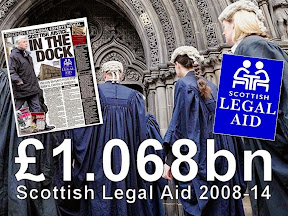















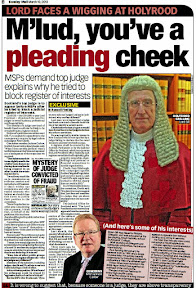
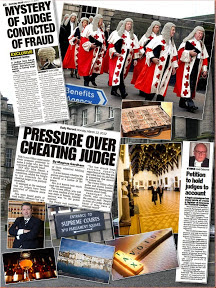
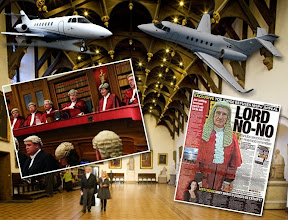


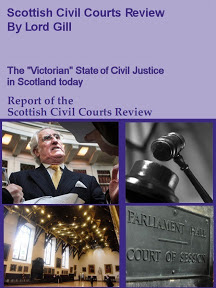
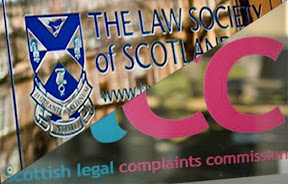




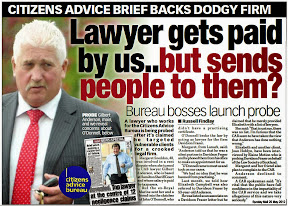



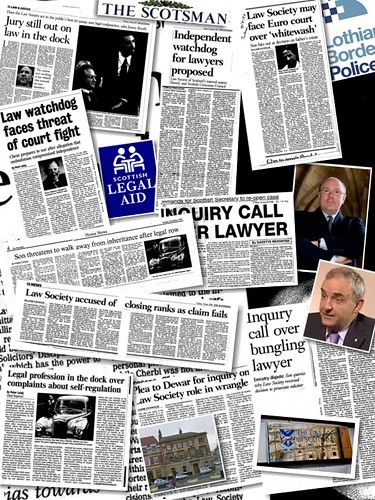




You must be logged in to post a comment.